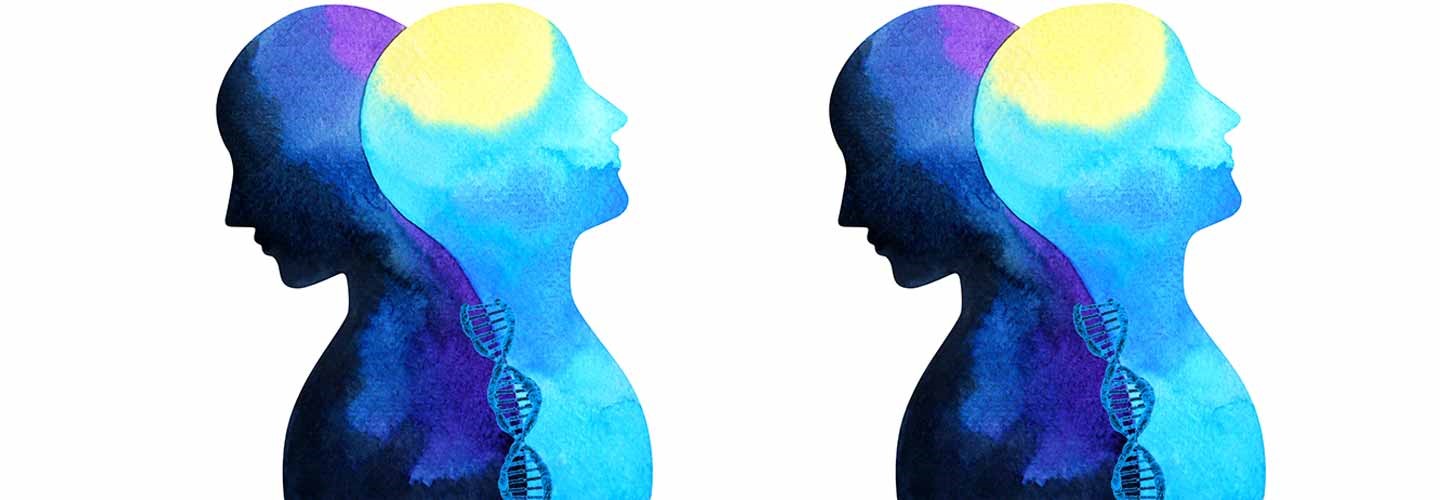Combating Chronic Stress and Mental Illness with Epigenetics
- Home
- Blog

Reader, here at Potomac Psychiatry, we believe that genetic and other diagnostic testing represents the frontier of precision medicine. You see, each of us has a unique genetic code that can predispose us to various health outcomes in life, from alcoholism to chronic stress and more. By understanding our patients’ unique genetic codes, we can begin to build a treatment plan that specifically addresses their susceptibilities. We call this Root Cause Psychiatry–and we believe this is the future of psychiatric practice.
Genes can be important markers of our mental health. But they are far from the only factor at play in determining our wellness outcomes. You see, there is no “depression gene” or “anxiety gene.” Instead, an individual inherits a susceptibility to these conditions through multiple different genes, which can get turned “on” or “off” through their interaction with numerous different factors that come from outside the brain, from interpersonal stress with loved ones to inflammation caused by fat cells and more. This process of flipping the switch is called epigenetics.
Epigenetics has profound implications on the state of our minds: After all, if your environment can flip genes “on,” leading to mental illness, it can also flip them “off,” leading to improved mental health. Below are just a few epigenetic factors that can negatively impact depression, anxiety, and chronic stress–and others that can possibly begin to heal them.
Can Drugs Lead to Epigenetic Changes in the Brain?
Drugs of abuse such as cocaine can trigger changes in certain brain regions, impacting hundreds of genes at a time. Some of these changes remain long after the drug has been cleared from the body. Research suggests that some of the long-term effects of drug abuse and addiction may be due to epigenetics: cocaine, for instance, can kindle mood disorders by epigenetically modifying certain genes. Similarly, alcohol has been associated with epigenetic changes that can predispose users to anxiety.
The interplay between drugs and genes via epigenetics is significant–and can have a big impact on mood disorders like anxiety and chronic stress. And it’s not the only lifestyle factor that can play a role–nutrition can, too.
Nutrition, Epigenetics, and Mental Illness
Obesity and nutritional aspects of a person’s lifestyle can also have profound impacts on mood regulation, including the onset of depression. As one example, we know that fat cells release proteins that are both known to cause inflammation throughout the body and are associated with psychiatric disorders in the brain. This and other factors lead many mental health professionals to conclude that obesity is a type of epigenetic stressor that contributes directly to altered brain function associated with mood disorders.
Healthy nutrition can also play a role in the recovery from a major mood or anxiety disorder: diets rich in lean protein, complex carbs such as fruits and vegetables, and good fats like olive oil, combined with aerobic exercise three to four times a week can assist patients in achieving weight loss goals that can trigger epigenetic changes in your cells in a positive way.
Using Epigenetics to Fight Stress and Mental Illness
Through the use of therapeutic interventions such as psychotherapy, healthy nutrition, and antidepressant medication, certain destructive epigenetic processes can be reversed, leading you toward a healthier, less stressed outlook on life. Mental wellness begins with the understanding of all the factors at play in your health, including biological and environmental factors. Potomac Psychiatry is dedicated to getting to the root of these factors to help you recover your health more precisely and quickly. Contact us at Potomac Psychiatry to learn more about epigenetics and how to fight stress and improve your mental health.
.png?width=144&height=144&name=Untitled%20design%20(34).png)


%20(1).png?width=352&name=15235366%20(1)%20(1).png)
